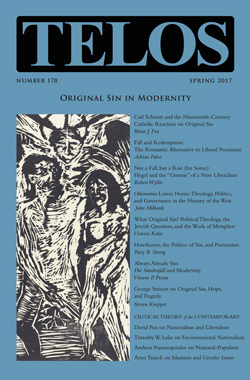Brian J. Fox’s “Carl Schmitt and the Nineteenth-Century Catholic Reaction on Original Sin” appears in Telos 178 (Spring 2017), a special issue on “Original Sin in Modernity.” Read the full article at the Telos Online website, or purchase a print copy of the issue in our online store.
 Carl Schmitt is frequently assumed to have primarily been a Catholic intellectual, or Christian political theologian, at least until becoming alienated from the Church in the mid-1920’s. The jurist’s book Political Theology is quite logically a main source of evidence for this standard interpretation of Schmitt’s intellectual biography. However, an assumption of Schmitt’s Catholic, or even simply Christian, bona fides serves more as a distraction in understanding the origins and contours of his early thought. This mistaken narrative hides the degree to which Schmitt’s brand of secular and proto-Hobbesian decisionism is contrary to the thought of his claimed forebears among nineteenth-century counter-revolutionary Catholic theorists. One way in which their opposition can be established is to examine the various treatments of the theological concept of original sin by Joseph de Maistre, Louis de Bonald, and Juan Donoso Cortés as compared to Schmitt’s treatment of the same in Political Theology and The Concept of the Political. By so doing, one can recognize, contra the standard narrative, Schmitt’s misanthropic view of human nature was firmly engrained in his approach to politics both separate from and well before his engagement with Catholic reaction. Furthermore, an examination of his Nachlass, only recently made available, demonstrates his deep fascination in the oldest Gnostic disavowals of orthodox Christianity as a significant source for his theoretical approach to politics.
Carl Schmitt is frequently assumed to have primarily been a Catholic intellectual, or Christian political theologian, at least until becoming alienated from the Church in the mid-1920’s. The jurist’s book Political Theology is quite logically a main source of evidence for this standard interpretation of Schmitt’s intellectual biography. However, an assumption of Schmitt’s Catholic, or even simply Christian, bona fides serves more as a distraction in understanding the origins and contours of his early thought. This mistaken narrative hides the degree to which Schmitt’s brand of secular and proto-Hobbesian decisionism is contrary to the thought of his claimed forebears among nineteenth-century counter-revolutionary Catholic theorists. One way in which their opposition can be established is to examine the various treatments of the theological concept of original sin by Joseph de Maistre, Louis de Bonald, and Juan Donoso Cortés as compared to Schmitt’s treatment of the same in Political Theology and The Concept of the Political. By so doing, one can recognize, contra the standard narrative, Schmitt’s misanthropic view of human nature was firmly engrained in his approach to politics both separate from and well before his engagement with Catholic reaction. Furthermore, an examination of his Nachlass, only recently made available, demonstrates his deep fascination in the oldest Gnostic disavowals of orthodox Christianity as a significant source for his theoretical approach to politics.








